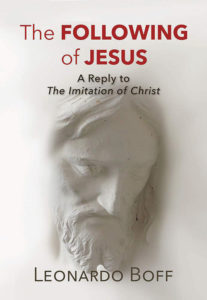The Following of Jesus: A Reply to The Imitation of Christ
Reviewed by Isaac Barnes May
June 1, 2020
 By Leonardo Boff, translated by Dinah Livingstone. Orbis Books, 2019. 144 pages. $25/paperback; $20.50/eBook.
By Leonardo Boff, translated by Dinah Livingstone. Orbis Books, 2019. 144 pages. $25/paperback; $20.50/eBook.
Brazilian theologian Leonardo Boff has a lofty reputation as one of the foremost exponents of liberation theology. For four decades, he has held that theology should be specifically concerned with the poor and marginalized. In the 1980s, Boff, who at the time was a Franciscan priest, was briefly silenced by the Vatican, who worried that liberation theology’s denouncement of poverty sounded too much like Marxism. Boff has since left the priesthood, but in this latest work, he sounds profoundly optimistic about the overall future of the Roman Catholic Church under Pope Francis and about the direction of Christianity as a whole.
The Following of Jesus is a short, meditative work, more of a devotional than a philosophical or analytical text. Boff’s book is couched in what he calls a “reply” to Thomas à Kempis’s fifteenth-century Christian classic The Imitation of Christ. The Spanish-language original of The Following of Jesus includes Boff’s own translation of The Imitation of Christ alongside his own writings, but the English-language translation published by Orbis drops this feature, the publisher noting that Kempis’s writing is already widely available in English. Boff’s book is really more of a companion or commentary to the older classic than a rebuttal or rejoinder. Kempis was strictly focused on inner spiritual life, ignoring the social and ethical teachings of Jesus. Boff aims to correct this omission.
In 31 short chapters, each no more than a handful of pages, Boff conveys his vision of a Christianity that esteems caring for the poor more than simple prayer or personal piety. Jesus’s life provides an example of conduct to be emulated; as Boff puts it, “What he did do was teach us how to live, love, and forgive.” People ultimately take steps to construct the Kingdom of God on earth if they follow in Jesus’s footsteps. Beyond this ethical vision, Boff also has a pro-scientific and environmentalist message, urging readers to see the Big Bang and evolution as moments of divine creation that show that humans are just one species among others, and that we are connected to all other living things.
Yet this is still a book grounded in an understanding of traditional Christianity and Roman Catholicism, one that may differ from the theological worldview of many unprogrammed Friends. The book begins with a detailed consideration of the mystery of the Trinity. Mary, the mother of Jesus, is a central figure, and at one point, there is a rather jarring description of her womb being “the holiest temple that has ever existed in this world.” Boff’s views on gender unfortunately do not match the radically compassionate and egalitarian ideals espoused in the rest of his theology. Based on his understanding of Scripture, Boff contends in one chapter that masculine and feminine binaries are instituted by God. He draws on stereotypes, identifying intellectual work as masculine, while defining tenderness and compassion as a feminine trait. Jesus supposedly combined the feminine ability to love with masculine vigor in confronting hypocrisy. Boff seems well-intentioned, but these sections could be taken as a defense of antiquated ideas of fixed gender roles.
The core contentions of The Following of Jesus, however, are ones that readers would benefit from taking to heart. Boff calls on readers to address the “social sins” that have created poverty, and makes a strong case that the message of Jesus requires his followers to recognize that any notion of salvation cannot be separated from what they do for those that the Bible refers to as “the least of these.” This book would be a welcome addition to a meetinghouse library, and could be a thought-provoking work to tackle with a book group. I found myself reading a chapter before going to bed in a reflective frame of mind, just as I sometimes read the Psalms.



Comments on Friendsjournal.org may be used in the Forum of the print magazine and may be edited for length and clarity.